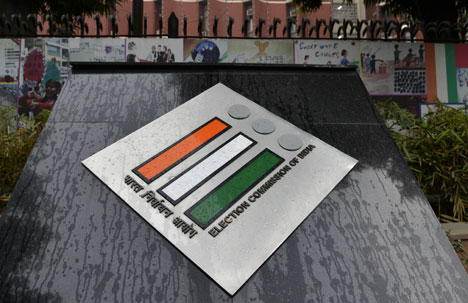
New Delhi: The Election Commission on Tuesday told the Supreme Court that it had been established through the use of voter-verified paper audit trail (VVPAT) machines in 843 Assembly constituencies across states that there were no glitches in the functioning of electronic voting machines as alleged by the Opposition.
In an affidavit filed before the apex court on Tuesday through advocate Amit Sharma, the poll panel said that since September 2017, mandatory verification of paper trail counts had been conducted in 843 Assembly constituencies in Gujarat, Himachal Pradesh, Nagaland, Tripura, Meghalaya and Karnataka, "and in all cases, the slip count has tallied with the electronic count."
Paper trail or VVPAT machines allow voters to check if their vote went to the intended candidate and have become crucial following allegations of voting machine tampering in several recent elections. The Opposition had demanded a return to paper ballots.
The EC's affidavit comes against the backdrop of two petitions filed by Congress leaders Kamal Nath and Sachin Pilot alleging large-scale discrepancies in the voter lists in Madhya Pradesh and Rajasthan, where Assembly elections are scheduled to be held this year-end.
The two leaders had urged the Supreme Court to issue directions to the EC to conduct VVPAT verification in at least 10 per cent randomly selected polling stations in each Assembly constituency to ensure free and fair elections. The leaders had also sought a directive to the EC to publish voter lists in the "text format" and the prohibition of deletion of voters from lists without intimating political parties.
The commission said that on January 1 this year it had directed its field-level functionaries to put only the "image PDF" of electoral rolls in the public domain. The PDF format cannot be tampered with, unlike the text format. The commission has also decided not to use the photos of voters on the electoral rolls, publishing only the names instead. The poll panel said the twin steps were aimed at preventing profiling of voters by vested interests.
"The Election Commission of India has taken a conscious policy decision in issuing these guidelines in order to protect the privacy of the electors as well as to prohibit profiling of electors in view of certain complaints... as well as the global challenges to electoral integrity," the EC said.
The poll panel said the objective was to utilise the most advanced technological tools to prevent manipulation of electors' data.
The EC said nobody had the legal right to demand the publication of electoral rolls in a particular format.
The commission assured the court that there would be no shortage of VVPAT machines for the 2019 Lok Sabha elections. The EVMs required for the polls will be procured by September 2018 and the VVPAT machines before November.
"The commission would like to allay any unfounded apprehensions regarding the supply of VVPATs for the Lok Sabha elections in 2019. The commission is committed to the 100 per cent deployment of VVPATs at all polling stations in future general elections, as well as bypolls to Lok Sabha and state legislative Assemblies," the EC said.
The commission asserted that no political party or individual could dictate terms to the EC, which is a constitutional body.
The commission termed Nath's petition "misconceived and malafide", viewing it as an attempt "to instruct/direct the Election Commission of India, which is a constitutional authority, to conduct elections according to his personal whims and fancies and that of the political party to which he stands affiliated".
"It is submitted herein that under Article 324 of the Constitution, the Election Commission of India is the custodian of the electoral process... and is vested with the powers of superintendence, direction and control of all elections in India," the EC said, adding that it had "always upheld the integrity of the election process... and has committed itself to the cause of holding free and fair elections".










